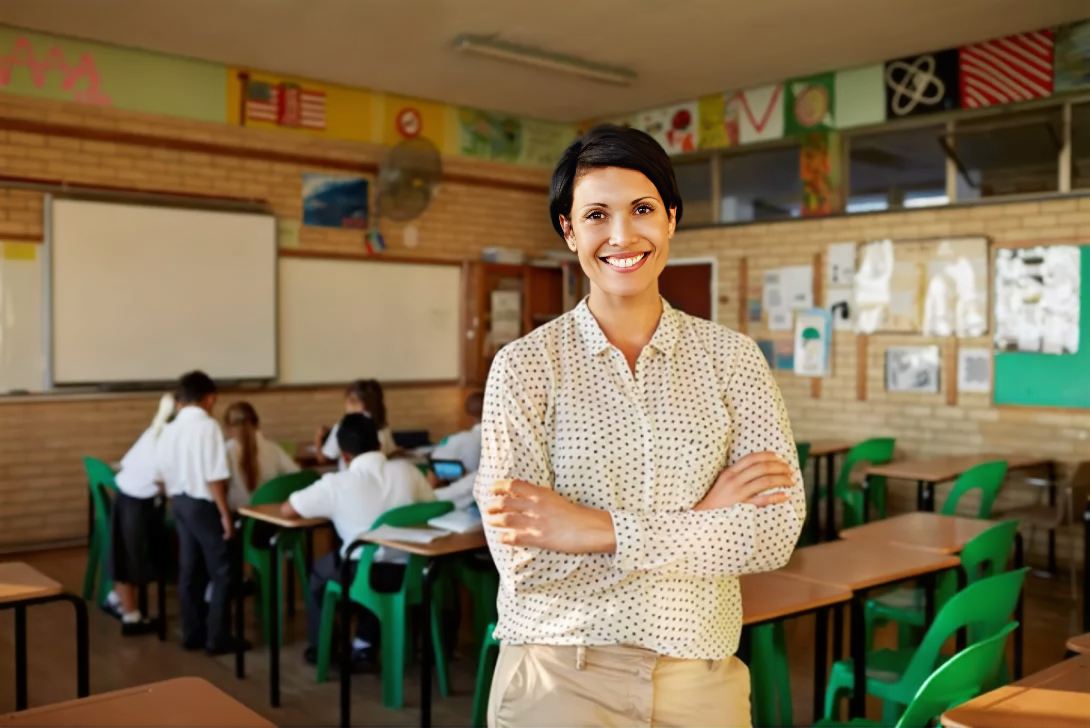
What's happening in October and November 2024?
This page gives you an overview of all the activity happening across our TeachingEnglish channels in October and November 2024.
For teachers, we'll be focusing on the theme of Knowing the subject. For teacher educators, the focus is Knowing the subject. Below you'll find free online training courses, live webinars and other online events, podcast episodes and research – all related to the bimonthly themes. You'll also find training and resources related to our evergreen themes of Gender, Inclusion, Climate and Assessment throughout the year.
Our theme workbook for teachers is designed to help you develop your understanding of our main theme through reflection and extra resources.
In addition to our themed events and content, we also have hundreds of lesson plans and classroom resources. Below we've selected some lesson plans to help you engage learners with topical issues and special United Nations days in October and November.
 Online training courses
Online training courses
We have a range of courses running connected to the theme of Knowing the subject and our evergreen themes. Live events and discussions related to these courses are hosted in our Courses for teachers community on Facebook. Find out more about all courses running in October and November below.
- Understanding language systems – enrol before 23 November
Develop your understanding of functional language and grammar and learn how to apply this knowledge to your teaching through reflection, analysis and effective presentation of use and form.
In this free online course, you will learn about the following:
- Understanding functional language
- Understanding grammar
- Understanding grammar – focus on form.
Find out more and enrol on this free course
Download the free Understanding language systems workbook- How to teach pronunciation – enrol before 23 November
Increase your understanding of phonology and your ability to support learners with effective pronunciation activities in the classroom.
In this free online course, you will learn about the following:
- Understanding pronunciation
- Engaging with pronunciation – individual sounds
- Engaging with pronunciation – techniques and activities.
Find out more and enrol on this free course
Download the free How to teach pronunciation workbook- Helping teachers to learn – enrol before 23 November
This free course is for teacher educators and teachers considering becoming a teacher educator. Discover how to support teachers in their professional development by planning and delivering effective training. Find out how to set up and support communities of practice to facilitate collaboration, and learn how to encourage all types of self-directed learning.
In this free online course, you will learn about the following:
- Understanding teacher learning and training
- Facilitating collaborative learning
- Supporting teacher autonomy and self-directed learning.
Find out more and enrol on this free course
Download the Helping teachers to learn workbook- Assessing learning – enrol before 24 March
Help all your learners benefit from and get actively involved in assessment in the language classroom.
In this free online course, you will learn about the following:
- Inclusive assessment approaches
- Engaging with assessment for learning
- Understanding teaching for tests.
Find out more and enrol on this free course
Download the Assessing learning workbook- Climate action in language education – enrol before 24 March
Learn to integrate environmental issues in English language teaching and develop the skills you need to take and sustain meaningful and impactful action to protect the environment in your local context.
In this free online course, you will learn about the following:
- Introducing environmental issues
- Lessons with a sustainability focus
- Making sustainability part of your learners' lives.
Find out more and enrol on this free course
Download the Climate action in language education workbook
Find answers to our most frequently asked questions about training courses.
 Online events and webinars
Online events and webinars
See our free online events and webinars for teachers and teacher educators below.
- World Teachers' Day Thursday 3 October
The British Council's World Teachers' Day conference is a global online event, featuring practical webinars by and for English teachers all over the world. In 2024, the event will take place over three days: Thursday 3, Friday 4 and Saturday 5 October, which is World Teachers' Day. There are 18 webinars in this year's programme.
Schedule and speakers
Morning: 09.00–12.30 (UK time)
09.00–10.00: Plenary session: Reflections on the future of English (Michael Connolly, Director of English and School Education)
10.15–11.15: Using mindfulness techniques in class (Blanka Pawlak)
11.30–12.30: Using low-tech resources in projects (Nnenne Ben-Ekechukwu)
Afternoon: 15.00–18.30 (UK time)
15.00–16.00: A picture is worth a thousand words (Jennifer Jean Lowe)
16.15–17.15: How can you best manage your resources? (Boma Karibo and Salome Ikokoyo)
17.30–18.30: Using movies to practise speaking (Samantha Alfaro Prospero)
Find out more and register for this online event.- World Teachers' Day Friday 4 October
The British Council's World Teachers' Day conference is a global online event, featuring practical webinars by and for English teachers all over the world. In 2024, the event will take place over three days: Thursday 3, Friday 4 and Saturday 5 October, which is World Teachers' Day. There are 18 webinars in this year's programme.
Schedule and speakers
Morning: 09.00–12.30 (UK time)
09.00–10.00: Plenary session: Our changing profession, our changing CPD needs (Aleksandra Popovski – IATEFL President)
10.15–11.15: Can rap engage our students? (Claudia Tshifwaka Tumba)
11.30–12.30: Intercultural awareness in the classroom (Daniel Tse)
Afternoon: 15.00–18.30 (UK time)
15.00–16.00: Productive classroom management (Tarek Abdulrahman)
16.15–17.15: How can games help revise vocabulary? (Alegra Nikolova-Ristovska)
17.30–18.30: How can we create global citizens? (Marcela Villán)
Find out more and register for this online event.- World Teachers' Day Saturday 5 October
The British Council's World Teachers' Day conference is a global online event, featuring practical webinars by and for English teachers all over the world. In 2024, the event will take place over three days: Thursday 3, Friday 4 and Saturday 5 October, which is World Teachers' Day. There are 18 webinars in this year's programme.
Schedule and speakers
Morning: 09.00–12.30 (UK time)
09.00–10.00: Improving workplace skills training (Girish Mulani)
10.15–11.15: What can we teach with stories? (Lucy Amelia Durance)
11.30–12.30: Why teach grammar communicatively? (Mohammad Nabil)
Afternoon: 15.00–18.30 (UK time)
15.00–16.00: Can English teachers use STEAM activities? (Jasmina Stulhi)
16.15–17.15: How can teachers use short stories? (Shimona Tyagi)
17.30–18.30: Building teacher communities, building learning (Stephen Mander and Rabia Shafi)
Find out more and register for this online event.- The place of English (15 October)
Please note, the content of this webinar is not aimed at teachers and is specifically for teacher educators who have a role in supporting the professional development of teachers.
How can teacher educators help teachers to think through and make sense of questions about the place of (varieties of) English in relation to other languages? Questions of correctness and variety choices and ownership of English; questions around native speaker/anglonormative teacher language proficiency; questions around the 'English-only classroom', multilingual approaches and linguistic diversity; questions about the value, benefit and practice of English as the language of teaching and learning.- Global practices in teaching English to young learners – Facebook live (24 October)
Join Fiona Copland and Sue Garton for this Facebook live event where they will be discussing how teaching practices have changed in the past ten years.
Join the event here: Global practices in teaching English to young learners.
The discussion is based on Global practices in teaching English to young learners: Ten years on.- Supporting teacher well-being: Connecting, learning and contributing (12 November)
Please note, the content of this webinar is not aimed at teachers and is specifically for teacher educators who have a role in supporting the professional development of teachers.
More details about this event coming soon.
12.00–13.15 (UK time)
Find out more and register for this online event- Teaching the four skills – mini-event (13 November)
In these sessions, our speakers will focus on how to teach the four skills in English language learning. Eman El Difrawy and Anestin Chi Lum will explore how to make writing tasks more engaging and interactive. Rhona Snelling will share ideas for teaching speaking skills that will help build confidence. You will also get inspiration for engaging listening and reading tasks that you can use in your classroom.
Schedule and speakers
10.00–14.45 (UK time)
10.00–11.00: How can we make writing interactive? (Eman El Difrawy)
11.15–12.15: How can we create confident speakers? (Rhona Snelling)
12.30–13.30: Can emojis help develop writing skills? (Anestin Chi Lum)
13.45–14.45: How can we work on the four skills? (panel discussion)
Find out more and register for this online event.- Building learning communities for our students – Facebook live (16 November)
In this live and interactive community event for teachers, we invite you to join our conversation on building learning communities for our students with Lucy Durance.
Join the event here: Building learning communities for our students- Facebook and Instagram Live events in October and November 2024
Join our online community of more than four million teachers worldwide. We will be hosting weekly events throughout October and November via our Facebook and Instagram channels.
These 30-minute 'live' sessions are a great opportunity for you to join teachers from around the world.
Engage with English language teaching experts and community members on a range of topics and themes to help you develop your teaching skills, and share ideas and questions with a vibrant global online community.
See what's happening in our community on Facebook
See what's happening in our community on Instagram
 For the classroom
For the classroom
See a selection of lesson plans below that you can use to focus on United Nations special days in October and November in your language teaching classrooms.
- International Day of Older Persons (1 October)
Title of lesson plan: Getting old
Age group: Secondary and adult
Level: B1 and above
This lesson explores attitudes to ageing. Learners decide 'how old is old?' and are introduced to vocabulary related to different age groups. Task 4 offers some discussion questions about getting old, and Task 5 is a role play where learners consider the advantages and disadvantages of different ages. Learners are introduced to the well-known poem about getting old, Warning, by Jenny Joseph. Learners discuss how we can live longer and explore the idea of living forever, and the extension activity is about the 'Adopt a Grandparent' organisation that exists in the UK.- World Space Week (4 October)
Title of lesson plan: Space
Age group: Primary
Level: A2 and above
In this lesson, learners will look at the planets in the solar system and features of planets. They will listen to and sing a song, then watch a story about features of different planets. They will practise describing planets using 'there is/are', and as an extension activity can work together to invent their own planet.
Title of lesson plan: Space – the sun, moon, stars and planets
Age group: Primary
Level: A2 and above
In this lesson, children play a game using vocabulary about space, sing a song about travelling to the sun and listen to and read a story about a fictional planet. They then design and draw their own story with support from a structured template.- World Mental Health Day (10 October)
Title of lesson plan: Are you active or not?
Age group: Primary
Level: A2 and above
This lesson plan is based on an activity from the British Council publication Integrating global issues in the creative English language classroom, which provides innovative ideas for teaching while raising awareness of the United Nations Sustainable Development Goals.- World Food Day (16 October)
Title of lesson plan: My healthy lunch
Age group: Primary
Level: A2 and above
In this lesson children draw a lunch setting and then play a dice game to decide what to eat from a selection of foods, which include many healthy choices. This game can be played as part of World Food Day, which is celebrated on 16 October each year, or whenever you cover the topic of food with your young learners.Title of lesson plan: Food I like/don't like
Age group: Primary
Level: A2 and above
This lesson starts with a review of food vocabulary, which can be adapted, and then learners will practise using the structure 'I like/don't like'. Learners then complete a simple survey by asking their classmates about their own food likes and dislikes. There are also several suggestions for follow-up or homework activities.Title of lesson plan: Green fingers
Age group: Secondary
Level: B1 and above
This lesson offers a variety of activities based on growing or gathering your own food. The warmer introduces the topic of gardens. There is a picture dictation that builds on garden vocabulary. Then learners read about current British gardening and food foraging trends and give their opinion on these trends. The optional extension activities are a role play about allotments and a question writing and discussion activity. There are differentiation opportunities throughout the plan, including a text at two different levels. This is a low-print lesson.- International Day for the Eradication of Poverty (17 October)
Title of lesson plan: Ending poverty
Age group: Primary
Level: B1 and above
Use this lesson in face-to-face or online lessons with your primary learners to discuss the concept of poverty.Title of lesson plan: What is enough?
Age group: Secondary
Level: B1 and above
Use this lesson in face-to-face or online lessons with your teenage learners to discuss the concept of poverty.- World Cities Day (31 October)
Title of lesson plan: Supporting city openness
Age group: Secondary
Level: B1 and above
This lesson explores the ways cities can attract and help with the integration of migrants into the local culture and society. The activity is based on themes and text from the OPENCities project.- International Day Against Violence and Bullying at School Including Cyberbullying (7 November)
Title of lesson plan: Is it because?
Age group: Primary
Level: A2 and above
This is a series of activities and related worksheets for you to download and use with the storybook Is it because? Learners will make an anti-bullying poster and give a presentation of the story. It forms part of the Promoting diversity through children's literature series, produced by the British Council Teaching Centre in Paris.Title of lesson plan: Anti-bullying
Age group: Secondary
Level: B1 and above
In this lesson, students will learn about the problem of bullies and how to behave if you are a bystander. Note that there is no emphasis on victims of bullying, because you may have victims in your own class and it is important to be sensitive about this. The aim is not to point the finger at anyone but instead to discuss and question our beliefs about what bullying is and how it can be dealt with.- World Science Day for Peace and Development (10 November)
Title of lesson plan: Asking for change
Age group: Secondary
Level: B2 and above
This lesson plan for secondary learners at upper-intermediate level explores how to use persuasive language.- International Day for Tolerance (16 November)
Title of lesson plan: Othello
Age group: Secondary
Level: C1 and above
This lesson uses Shakespeare's play 'Othello' to explore early modern and contemporary attitudes to race, and gives learners supported practice in analysing and interpreting extracts of the play. Learners will be introduced to four key characters, will engage in role play and will have the opportunity to use persuasive language to act out a mock court case.- World Children's Day (20 November)
Title of lesson plan: Young market traders
Age group: Secondary
Level: B2 and above
Young market traders is a complete set of teaching resources designed around interesting and unusual photographs, with activities to activate your learners' higher-level critical-thinking skills. This pack deals with the topics of travel, lifestyle, childhood and child labour and practises both listening and speaking skills.- World Television Day (21 November)
Title of lesson plan: Young people and television
Age group: Secondary
Level: A2 and above
This lesson plan for teachers of teenagers and adults at pre-intermediate level explores the theme of TV programmes. Learners will make a poster and develop speaking skills in the form of a role play.
Title of lesson plan: Rants and raves – Reality TV
Age group: Secondary
Level: A2 and above
In this lesson, learners will listen to a person's reflection of reality TV. They will put the monologue in order and answer comprehension questions. There are also suggestions for developing the theme of reality TV to practise specific areas of grammar.
 Podcast episodes
Podcast episodes
See all our podcast episodes connected to October and November's themes below.
- TeachingEnglish podcast: How can we teach vocabulary and grammar more communicatively?
It's episode 2 of our new series, and this week we are discussing how to teach vocabulary and grammar more communicatively. We talk to Jo Cummins, freelance ELT teacher, trainer and materials writer. Jo shares some ideas for communicative activities in the classroom that can help learners move from passive grammar and vocabulary knowledge to active use of language for communication. We also look at how classrooms can become a 'safe space' for learners to make errors, so that they can become more confident speakers outside the classroom. Later, we are joined by Luis Carabantes from Queen Mary University of London, who talks to us about communicative language teaching (CLT). We also discuss the importance of providing learners with authentic language and tasks, and of questioning the reasons for teaching what we teach.
Listen to the episode and download the show notes
 Publications, research and insight
Publications, research and insight
See publications related to October and November's themes below.
- Knowing the subject self-study booklet
This self-study guide for teachers and teacher educators looks at Knowing the subject. It forms part of a series of self-study booklets, in which teachers and teacher educators will find useful theory and practice for teaching English effectively, including short case studies and professional development activities to do individually and with colleagues.
Knowing the subject self-study booklet- Why won't they speak English?
This report draws on the framework of self-determination theory to investigate primary school children's anxiety and autonomy/agency during lessons for speaking English.
Why won't they speak English?- Global practices in teaching English to young learners: Ten years on
This report presents a comparative analysis of data collected in 2010 and 2020 on the Global Practices in Teaching English to Young Learners.
Global practices in teaching English to young learners: Ten years on- L2 reading and reading-while-listening in multimodal learning conditions: An eye-tracking study
Multimodal reading materials, which combine text, audio and pictures, are frequently used in English language teaching to support reading development and improve reading comprehension. However, our understanding of the effectiveness of these methods mainly comes from studies using post-reading tests that do not indicate how learners engage with these different sources of information nor how online processing is related to levels of comprehension. This study used eye-tracking to investigate children and adult second-language (L2) learners' processing of the different input sources in two multimodal reading conditions (i.e. reading and reading-while-listening to an illustrated text).
L2 reading and reading-while-listening in multimodal learning conditions: An eye-tracking study.
I am in love with the topic